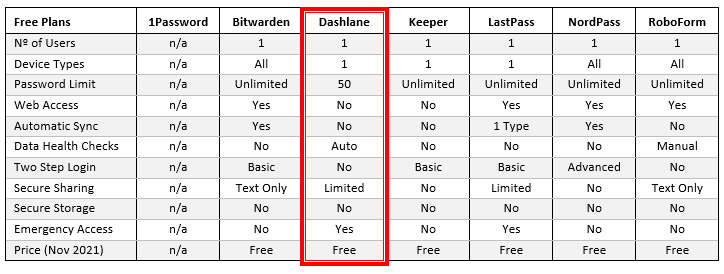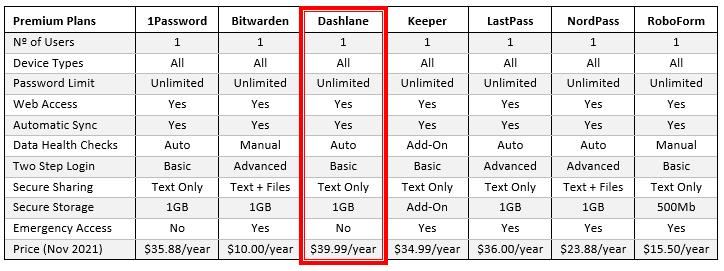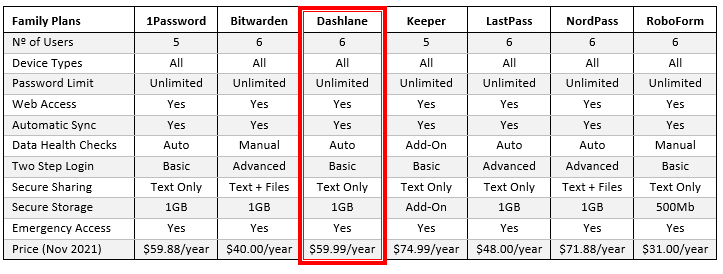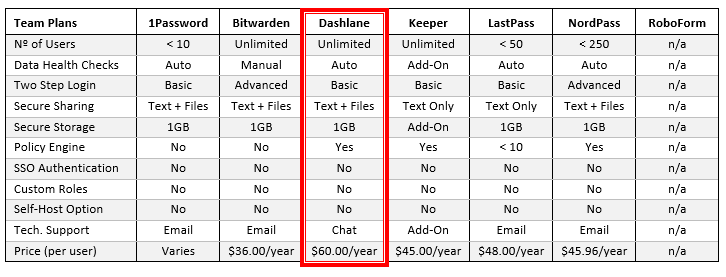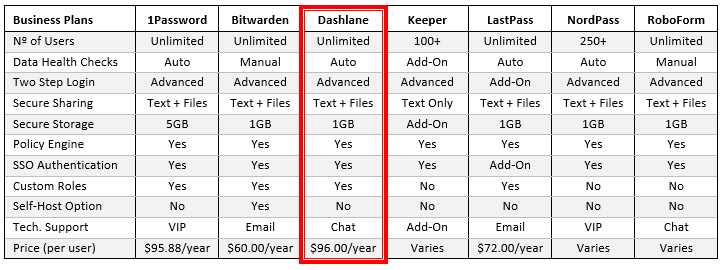Due to the frequency at which Dashlane updates its password manager, any Dashlane review is likely to be quickly out of date. Consequently, our review of the Dashlane password manager focuses on its core capabilities and how they compare against the capabilities of other password managers.
So far in 2021, Dashlane has updated its web app and browser extension twenty times. There have been further updates to desktops app and mobile apps throughout the year – some to fix bugs that have slipped through beta testing, but most to enhance the user experience and add capabilities to the existing product.
In addition, Dashlane has also dropped some capabilities from its range of subscription plans, or dropped subscription plans altogether – for example the Premium Plus and Premium Plus for Families plans, which offered up to $1 million in identity theft insurance, credit monitoring, and identity restoration support.
Consequently, our Dashlane review is a point-in-time review which has looked at the password manager´s current plans and capabilities and compared them against some of its biggest competitors. Ultimately, despite some cool features and an ultra-user-friendly interface, Dashlane does not come out well in our comparisons.
Dashlane´s Free Plan
We start our Dashlane review with its free plan – a feature-limited version of its premium plan that enables users to save up to fifty passwords on one device. Data saved for auto-filling login credentials and payment details is stored locally (with no web access to data if you lose the device), and you can only share passwords for up to five accounts through the secure sharing feature.
In its favor, Dashlane´s free plan supports data health checks that will alert you to weak, re-used, and compromised passwords, and you will receive an automatic alert if credentials you have saved in the password manager are exposed in a data breach. However, as the table below demonstrates, the capabilities of Dashlane´s free plan are uninspiring when compared to other free plans.
In April 2021, Dashlane launched an Essentials plan which allowed users to save and synchronize an unlimited number of passwords across any two devices. The cost of the plan was $23.99 per year – which was considerably overpriced when compared to the capabilities of free password managers such as Bitwarden. As of December 2021, Dashlane is no longer offering this option to customers.
Dashlane´s Premium Plan
Dashlane´s fully-featured premium plan is a considerable improvement on its free plan. Like most premium plans, Dashlane supports cross-device synchronization, two-step login, and secure sharing. It also offers dark web monitoring for up to five email addresses, an automatic password changer, and a VPN for additional privacy if you connect to an unsecured WiFi service.
However, these extra features come at a price. Dashlane has the most expensive annual subscription of the password managers featured below (notwithstanding that Keeper charges more for Add-Ons and NordPass charges more when you renew your subscription), and it is nearly four times as expensive than Bitwarden – the best password manager in this category for value-for-money.
One benefit of Dashlane´s premium plan is that you can take advantage of a 30-day free trial to see if the extra features are worth the investment. However, before taking advantage of this option, you are advised to read the reviews of Dashlane posted in the Chrome Web Store by people who are – or who were – subscribing to Dashlane´s premium plan (Click on the “Reviews” tab).
Dashlane´s Family Plan
Dashlane´s family plans provide up to six premium plans for members of the same family under one account. As well as being a cost-effective way for multiple members of the same family to better protect personal online accounts, the plans come with a dashboard through which family members can share login credentials and payment details for shared family accounts.
However, although including all the features of the premium plan, when you compare Dashlane´s family plan to those of its competitors, Dashlane lacks support for advanced two step login (i.e., YubiKey) and secure file sharing (i.e., for copies of passports, driving licenses, etc.). So, whereas, Dashlane is very security conscious in some areas, it is “security-lite” in others.
One further issue with Dashlane´s family plan is the price. It is almost 50% more expensive than market leader Bitwarden, and almost twice the price of the feature-limited RoboForm plan. Furthermore, there is no opportunity to take advantage of a free family plan trial before committing to a subscription. You can, however, take a free trial of a premium plan and then upgrade.
Dashlane Review of Business Plans
So far in our Dashlane review, we´ve established that Dashlane´s free plan is lacking in capabilities and that its premium and family plans are a bit “hit-and-miss” for security features. In addition, its premium and family plans are more expensive than most of its competitors. When it comes to business plans, Dashlane fairs a little better – but only a little better.
Dashlane provides a choice of two business plans. Its “Teams” plan is practically a fully-featured version of its “Business” plan with the exception that the business plan supports SAML-based Single Sign On. Beyond that, the only difference between the plans is that each user in a Teams plan also gets a free premium account, while each user in a Business plan gets a free family account.
Comparing the prices of Teams plans does Dashlane a slight disservice, because although it appears more expensive than its competitors, it is the same price as Bitwarden´s fully-feature Enterprise plan (below) once you exclude SAML-based SSO. It is also worth noting that, with the exception of Bitwarden and Keeper, other Teams plans place limits on the number of users – while Keeper charges extra for dark web monitoring, secure storage, and technical support.
With regards to technical support, Dashlane´s chat service is available in English, French, and German from 9:00 a.m. to 6:00 p.m. EST, Monday through Friday. Businesses subscribing to a Teams or Business plan with fifty users or more are also assigned a Business Success Manager who can guide you through deployment of Dashlane, alert you to changes being made to the software, and answer questions about how to make the best use of Dashlane´s capabilities.
However, the provision of SSO Authentication and a technical support chat service hardly justifies the big bump in price between Dashlane´s Teams plan and its Business plan – especially as password managers are not complicated to deploy and manage. For significantly less per user, businesses can opt for Bitwarden´s Enterprise plan with SSO authentication and a self-host option – which can be beneficial if the business operates in a regulated industry in which the control of data is essential.
Dashlane Review Conclusion: Can´t be Recommended for Multiple Reasons
Although Dashlane has some cool features and a user-friendly interface that can encourage individuals to use the password manager, our Dashlane review has uncovered too many negatives to recommend it at this point in time. To summarize:
- Dashlane´s uninspiring and capability-limited free plan sets the tone for “hit-and-miss” security features in its premium and family plans – which are substantially overpriced compared to its competitors and receive poor reviews.
- Businesses willing to make do without SAML-based SSO could take advantage of Dashlane´s Teams plan; but, for the same price, you could have SSO Authentication and a self-host option from Bitwarden – albeit without the help of a Customer Success Manager.
- Finally, there is the caveat that Dashlane frequently makes changes to the password manager´s capabilities and the plans themselves. There is no guarantee the same capabilities will still be included in any plan when it comes to renewing a subscription.
Consequently, we recommend looking elsewhere for a business password manager. Bitwarden appears to be the best alternative for Dashlane based on the tables above; and, if you would like to find out more about how the two password managers compare to each other, we have compiled a comparison of Bitwarden versus Dashlane that includes a selection of Frequently Asked Questions.

